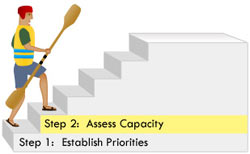Progression Tracker
Do You Need a Funding Plan?
Introduction to the Six Steps
Step 1: Establish Priorities
Step 2: Assess Capacity
- Capacity discussion questions
- Strengths, weaknesses, opprtunities, & threats analysis
Step 4: Identify Funding Sources Step 5: Evaluate & Select Funding Sources
Step 6: Write & Implement Plan
Final Quiz
Sample Finance Plans
List of Case Studies
References & Additional Resources
Step 2. Assess Fundraising Capacity
 Once you have established your
organization's overall priorities, the next step is to assess your organization's
fundraising capacity.
Once you have established your
organization's overall priorities, the next step is to assess your organization's
fundraising capacity.
We define fundraising capacity here as an organization's ability to raise funds in order to perform its overall priority activities and effectively sustain itself over the long term. Your organization's fundraising capacity will affect which funding options you pursue and what activities are feasible for you. Determining your organization's fundraising capacity now will mean that you can choose the most effective funding options when you develop your plan.
On the next three pages, we show you how to assess capacity, first through discussion questions and then through a formal assessment called "Strengths, Weaknesses, Opportunities, and Threats" analysis.
Note: A critical piece of this assessment (and one that is often not discussed) is determining if your organization has the capacity to handle the funds once they are received. In other words, if all fundraising goals are achieved tomorrow, will your organization have the resources in place to be able to invest the funds properly to get maximum returns? This discussion is a first step in moving from a simple fundraising plan to having a comprehensive finance plan (more on this in Step 6). Well-managed money gives people more confidence in your organization and provides a sense of accountability.

"Enhancing your self-awareness helps you to be more honest, sincere and congruent.
It puts you in touch with your expectations. It increases your awareness
of times when you may feel disappointed and impatient. It helps you focus
on your goals - outcomes and experiences - that will be rewarding to
you."
-Robert Myrick and Tom Erney, authors of 'Youth helping Youth:
a Handbook for Training Peer Facilitators'5
Citation: See Resources, Works Cited #4 and #5
![[logo] US EPA](https://www.epa.gov/epafiles/images/logo_epaseal.gif)